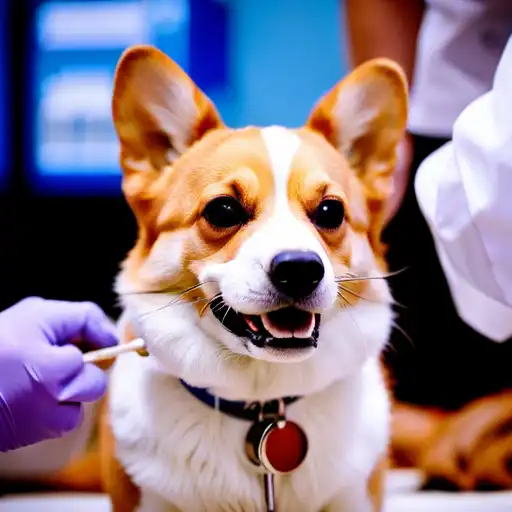The Importance of Health Testing in Corgi Breeding

Hey there, fellow corgi enthusiasts! Have you ever wondered why health testing is so crucial in the world of corgi breeding?
Well, let me tell you, it's like having a crystal ball that can predict and prevent potential health issues in these adorable little furballs. Health testing is the secret ingredient that ensures the well-being and longevity of our beloved corgis.
By identifying genetic issues and eliminating hereditary health problems, we can improve the overall quality of the breed. It's not just about producing cute and cuddly pups; it's about responsibly preserving the heritage of these amazing dogs.
So, if you want to be a part of this noble mission and ensure the freedom of future generations of corgis from unnecessary health issues, health testing is the way to go! Let's dive deeper into the importance of health testing in corgi breeding and how it can benefit both breeders and our furry friends.
Understanding the Purpose of Health Testing
Understanding the purpose of health testing is crucial when it comes to ensuring the well-being and genetic health of your corgi breeding program. By understanding genetic disorders and the importance of early detection, you can make informed decisions that will benefit your dogs and their future offspring.
Genetic disorders can occur in any breed, and corgis are no exception. Through health testing, you can identify potential issues before they become major problems, allowing you to make informed breeding choices. Early detection is key because it gives you the opportunity to take preventive measures, such as selecting healthier breeding pairs or implementing management strategies to minimize the risk of passing on genetic disorders.
Identifying Genetic Issues in Corgi Breeding
When it comes to breeding Corgis, it's crucial to identify any potential genetic issues that may be present. By doing so, you can prevent the passing on of inherited health problems to future generations.
Identifying and addressing these issues isn't only important for the well-being of the individual dogs, but also for the overall health and longevity of the breed.
Engaging in responsible breeding practices, which include thorough health testing, is essential for ensuring the continued health and vitality of Corgis.
Preventing Inherited Health Problems
To prevent inherited health problems in Corgi breeding, it's crucial for you, as a breeder, to identify genetic issues through health testing. By conducting genetic testing on your breeding dogs, you can determine if they carry any hereditary diseases or genetic abnormalities that could be passed on to their offspring. This proactive approach ensures that you aren't unknowingly perpetuating health issues within the Corgi population.
One of the key benefits of genetic testing is the ability to prevent hereditary diseases. By identifying dogs that carry genetic mutations or disease-causing genes, you can make informed decisions about which dogs to breed. This helps to reduce the risk of passing on these diseases to future generations. Additionally, genetic testing allows you to select breeding pairs that are genetically compatible, further decreasing the likelihood of health problems in the offspring.
Genetic testing also provides breeders with valuable information about the overall health and genetic diversity of their breeding stock. It enables you to make informed decisions about which dogs to include in your breeding program, ensuring the continued improvement and preservation of the Corgi breed.
Ensuring Breed Health
How can you actively identify genetic issues in Corgi breeding to ensure the health of the breed? By implementing genetic screening methods, you can play a crucial role in preserving the breed's health and well-being.
Here are four ways you can actively identify genetic issues in Corgi breeding:
- Conduct thorough health tests: Prioritize genetic testing for common hereditary diseases, such as degenerative myelopathy and progressive retinal atrophy. This helps identify potential health issues in Corgis before breeding.
- Collaborate with reputable breeders: Work with breeders who prioritize genetic screening. They'll have access to comprehensive health records and will be committed to breeding healthy Corgis.
- Stay updated on breed-specific health concerns: Stay informed about the genetic issues that commonly affect Corgis. This knowledge will help you ask the right questions and make informed breeding decisions.
- Support ongoing research: Stay connected with the scientific community and support research initiatives focused on identifying and addressing genetic issues in Corgis. This will contribute to the overall health and preservation of the breed.
Responsible Breeding Practices
To ensure the health and well-being of the breed, you must continue actively identifying genetic issues in Corgi breeding by implementing responsible breeding practices.
Responsible breeding practices play a crucial role in genetic disease prevention and maintaining the overall health of the Corgi population. By carefully selecting breeding pairs based on their health records and genetic testing, breeders can reduce the risk of passing on inherited diseases to future generations.
Regular health screenings, such as hip and elbow evaluations, eye examinations, and genetic testing for specific conditions, can help identify potential health concerns and enable breeders to make informed decisions.
Additionally, responsible breeders prioritize the overall well-being of their dogs, providing proper nutrition, exercise, and socialization to produce happy and healthy Corgis.
Ensuring the Health and Longevity of the Breed
To ensure the health and longevity of the breed, there are several key points you need to consider.
First, genetic disease prevention is crucial. By conducting health tests and only breeding dogs with clear results, you can minimize the risk of passing on inherited conditions.
Secondly, selective breeding practices play a vital role in maintaining the overall health of the breed. By carefully choosing mating pairs based on their genetic backgrounds, temperament, and physical traits, you can help preserve the Corgi's health and characteristics.
Lastly, it's essential for breeders to educate themselves and stay updated on the latest research and advancements in canine health. This knowledge empowers them to make informed decisions and take necessary measures to safeguard the future of the breed.
Genetic Disease Prevention
To ensure the health and longevity of the breed, it's vital that you prioritize genetic disease prevention through comprehensive health testing in Corgi breeding. By preventing genetic disorders, you can help ensure that future generations of Corgis are healthy and free from hereditary diseases.
Here are four reasons why health testing is beneficial in preventing genetic disorders:
- Early Detection: Health testing allows breeders to identify potential genetic diseases in Corgis at an early stage, enabling them to make informed breeding decisions and prevent the transmission of these diseases to future generations.
- Improved Breeding Practices: Through health testing, breeders can select dogs with a lower risk of genetic disorders as part of their breeding program. This helps in promoting overall health and reducing the occurrence of inherited diseases within the breed.
- Increased Lifespan: By prioritizing genetic disease prevention, breeders can contribute to increasing the average lifespan of Corgis. Identifying and eliminating genetic disorders through health testing can lead to healthier and longer lives for these beloved dogs.
- Breed Preservation: Health testing plays a crucial role in preserving the integrity of the Corgi breed. By preventing the spread of genetic disorders, breeders can maintain the breed's unique characteristics and ensure its long-term sustainability.
Selective Breeding Practices
When implementing selective breeding practices to ensure the health and longevity of the breed, it's important to prioritize comprehensive health testing in Corgi breeding. By utilizing selective breeding techniques, breeders can carefully choose which dogs to mate, taking into consideration their health records and genetic diversity. This helps to reduce the risk of genetic diseases being passed down to future generations.
Genetic diversity in Corgi breeding is crucial to maintain a strong and healthy population of these adorable dogs. Breeding from a limited gene pool can lead to an increased prevalence of inherited diseases and a decrease in overall vitality.
Responsible Breeder Education
Ensure the health and longevity of the Corgi breed by educating responsible breeders about the importance of health testing. By providing them with the knowledge and tools necessary to make informed decisions, we can promote ethical breeding practices and ultimately improve the overall well-being of these beloved dogs.
Here are four key reasons why responsible breeder education is crucial:
- Responsible Breeder Certification: Educating breeders about the importance of health testing can lead to the establishment of a certification process. This certification would ensure that breeders meet specific standards and guidelines to promote the health and welfare of the Corgi breed.
- Improved Breeding Practices: Educated breeders will have a better understanding of genetic diseases and how to avoid passing them on to future generations. This knowledge will enable them to make informed decisions about which dogs to breed, reducing the risk of inherited health issues.
- Long-Term Health and Longevity: By prioritizing health testing, breeders can identify potential health problems early on and take preventative measures. This proactive approach will help to improve the overall health and longevity of the Corgi breed.
- Consumer Confidence: Educated breeders who prioritize health testing and ethical breeding practices will gain the trust and confidence of potential dog owners. This trust is crucial to ensure that people are getting a healthy and well-bred Corgi, reducing the risk of purchasing a dog with underlying health issues.
Eliminating Hereditary Health Problems
Eliminating hereditary health problems in corgi breeding requires thorough health testing. By promoting breed longevity, we can ensure that future generations of corgis are healthy and free from genetic diseases.
Through responsible breeding practices and comprehensive health testing, we can identify and eliminate potential health issues that may be passed down from one generation to the next. This not only benefits the individual dogs but also contributes to the overall well-being of the breed.
By prioritizing the health of the corgis, we can help them live longer, happier lives, and provide their owners with the peace of mind that comes with knowing they've a healthy companion.
Improving the Quality of Corgis Through Health Testing
How can health testing contribute to improving the quality of Corgis? By implementing health testing in Corgi breeding practices, breeders can make significant strides in improving the overall breed quality. Here are four ways health testing can help in this endeavor:
- Identifying genetic health issues: Health tests can uncover any potential genetic health problems that may be present in a Corgi. By knowing the health status of a dog, breeders can make informed decisions about which dogs to breed, ensuring that only healthy individuals are used for breeding.
- Selecting healthier breeding pairs: With the information obtained from health tests, breeders can carefully select breeding pairs that are less likely to pass on genetic health issues to their offspring. This helps in producing healthier and stronger Corgis.
- Reducing the risk of inherited diseases: By testing for specific genetic diseases, breeders can avoid breeding dogs that are carriers or affected by these diseases. This can significantly reduce the risk of passing on inherited diseases to future generations of Corgis.
- Improving overall breed health: Through responsible health testing, breeders can work towards improving the overall health of the Corgi breed. By eliminating or reducing the prevalence of genetic health issues, breeders contribute to the long-term well-being and quality of Corgis.
Benefits of Health Testing for Corgi Breeders
To reap the benefits of health testing, Corgi breeders can utilize the information obtained from these tests to make informed decisions about their breeding practices. By conducting health tests on their breeding dogs, breeders can identify potential health issues that may be present in their lines. This allows them to select healthier dogs for breeding, reducing the risk of passing on genetic diseases to future generations.
Health testing also provides breeders with valuable information about the overall health and soundness of their dogs, enabling them to make better breeding choices. Moreover, health testing helps breeders maintain the reputation of their kennel and the breed itself by producing healthier and genetically sound Corgis. This can lead to increased demand for their puppies, which can ultimately result in higher profits and a more sustainable breeding program.
The Role of Health Testing in Responsible Corgi Breeding
You can ensure responsible Corgi breeding by incorporating health testing into your breeding practices. By implementing ethical breeding practices and preventing diseases, you can contribute to the overall health and well-being of the Corgi breed.
Here are four reasons why health testing plays a crucial role in responsible Corgi breeding:
- Early detection: Health testing allows you to identify any potential health issues early on, giving you the opportunity to make informed breeding decisions and prevent the transmission of genetic diseases.
- Improved breed quality: By selecting only healthy dogs for breeding, you can help maintain and improve the overall quality of the Corgi breed, ensuring its longevity for future generations.
- Responsible ownership: Health testing demonstrates your commitment to responsible ownership and breeding. It shows that you prioritize the health and welfare of your dogs above all else.
- Breeder reputation: Incorporating health testing into your breeding practices enhances your reputation as a responsible breeder. It attracts potential buyers who value the health and well-being of their future pets.
Frequently Asked Questions
How Much Does Health Testing Typically Cost for Corgi Breeders?
Health testing for corgi breeders can vary in cost, but it's a crucial investment. By ensuring the health of your corgis through testing, you can prevent future health issues and provide peace of mind to potential buyers.
Are There Specific Health Issues That Corgis Are More Prone To?
Corgis have some genetic predispositions and breeding challenges. They are prone to certain health issues like hip dysplasia and degenerative myelopathy. Health testing is crucial to ensure the well-being of future generations.
Can Health Testing Completely Eliminate the Risk of Hereditary Health Problems in Corgis?
Health testing can help reduce the risk of hereditary health problems in corgis, but it can't completely eliminate it. However, the benefits of health testing in corgi breeding go beyond reducing health risks, ensuring healthier and happier puppies.
Is It Necessary to Health Test Both Parents Before Breeding Corgis?
Is it necessary to health test both parents before breeding corgis? Absolutely! Health testing ensures the well-being of the puppies and helps eliminate hereditary health problems. It's a responsible practice that benefits both the breed and potential owners.
Can Health Testing Improve the Temperament and Behavior of Corgis?
Improving temperament and behavior of corgis can be achieved through health testing. By identifying and addressing potential genetic issues, health testing positively impacts breeding outcomes, ensuring healthier and more well-rounded corgis for you to enjoy.











